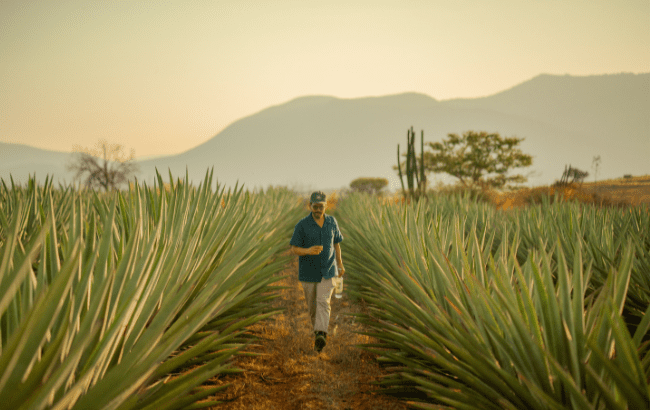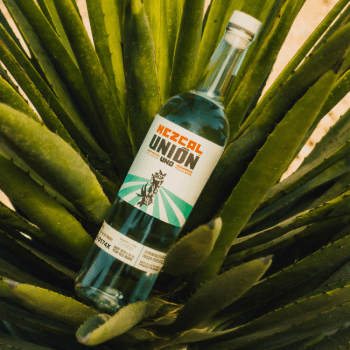Mezcal Unión: education key to category growth
Alejandro ‘Champ’ Champion, co-founder of Mezcal Unión, explains why more education is needed before mezcal can reach Tequila’s popularity.

Tequila’s swift rise has been well-documented over the last few years, but mezcal, by contrast, has watched growth move at a “steadier pace”, which Champion says is due to the “big challenge” of educating people on what is a “very complex category”.
Mezcal Unión is owned by spirits giant Diageo, a partnership that Champion believes has helped the brand expand not only its territorial footprint, but also strengthen its purpose.
With Diageo’s support, Champion says: “We have been able to farm more agave and we produce more mezcal. It has diversified more opportunities and allowed us to share our juice in different countries, in different cities, in different bars, restaurants and liquor stores. But we are still in the beginning. I mean, we’re still full throttle into taking this dream further.”
Through the connection to Mexico and as an agave spirit, mezcal is often grouped with Tequila, but both categories “need to be looked at differently for growth”, Champion explains.
While Tequila has been a flag that has represented Mexico for generations, he observes that “in the last decade we’ve seen how this category [mezcal] is exponentially growing and is winning a little bit of that share from Tequila”, but, he adds, “I don’t think in any near future mezcal would be the size of Tequila, because mezcal has its own nature.”
“That is because of how it is done – by hand. It’s primarily a small batch and in our case, we’re a union. We don’t have a big distillery where we can just scale up capacity. The way and the ethos behind Mezcal Unión – which, by the way, its name says it all – we’re about building a community, a network among farmers and producers.
“Tequila is just made from a particular region of Mexico with one type of agave. When we look at mezcal, however, you have this massive biodiversity of different agaves that grow in different areas, and they all represent the terroir from where they come from. Then, at the same time, these families that have inherited the knowledge from one generation to another, and they themselves then have their own specific techniques.”
Utilising versatility in cocktails
Compared to Tequila, mezcal is not just a predominant flavour from a particular plant, even though, Champion notes, “Tequilas are different and they vary, from one place to another, and there’s different maestros behind each Tequila.”
He says that the “biological, sensorial palate that mezcal has to offer across many states of Mexico, along many different rural communities, brings into place a spirit that is very complex, but very complex to explain as well.”
There is a shift in culture as to how people are drinking – now, more often than not, from home – and people are replicating cocktails they first try at bars in their own spaces.

To Champion, mezcal can play in this area as an “innovative twist”, but first, a lot of education is needed. “Education will allow us to expand the consciousness and the information upon how it’s produced, how we taste, and the versatility that there is to innovate and implement as a base spirit with style”, he says.
Mezcal has certain characteristics that also apply to Scotch – namely a smokyness, which lends itself well in an Old Fashioned. But Champion says mezcal “should not just be about smoke”.
“What we try to do at Mezcal Unión is to be balanced between flavours and aromas”, he says. “Let’s look at agave-driven cocktails like Palomas or Margaritas and the citrusness needed for these. Mezcal Uno, which is a blend of a six- to eight-year-old agave espadin and 14-year-old agave Cirial, has tons of citruses, so mezcal in that sense can be easily complemented as a base period for any agave-driven cocktail. And it’ll elevate them further too because of the complexity from the terroir that these diverse agaves have.
He continues: “And any cocktail where you use gin, all those botanicals, agave has to offer too, but in a different way. It has a botanical aspect. It has a citrus aspect. A herbaceousness aspect. It can be sweet. There’s all this complexity that, as you look at gin, whisky or Scotch, Tequila and other spirits… mezcal has it all in that it can easily be used in the infrastructure of any cocktail.
“As we educate people and let them know where mezcal comes from and the heritage, the craftsmanship that is behind the amount of time for these plants to grow, and then when we teach people how to sip on it or make a cocktail, that is the education that has shifted in the mind.
“For a lot of those who misunderstood or don’t know about mezcal, the minute they have an opportunity to sip with someone that knows about it, as we believe, their minds change, and all of a sudden, their imagination starts turning and they start creating cocktails at home – which allows us to expand ourselves just from the on- and off-premise.”
Big challenge
Mezcal Unión started its collaboration with one family and its production network now spans several in nine different regions across Oaxaca, all with their own agave fields and distilleries.
Meanwhile, upon the brand’s launch in the US a decade ago, it was hard to find a bottle of mezcal in cities such as San Francisco and New York, while only a handful of restaurants and bars understood how to properly utilise it.
Now, though, on his travels, Champion says he finds mezcal at every gas station in California, he’s seen decent selections at independent liquor stores across Australia and mezcalerias are popping up in major European cities.
There’s no denying awareness is on the up, but Champion recognises that there is still a big challenge in making the category more mainstream: “Even though a lot of people might know the word ‘mezcal’, or might have have had a cocktail with it, or a sip here and there, there’s still a lot of education – and even for those have already been enjoying it.”
“I say this because, for instance, every time I do staff training (and a lot of these staff trainings are very respected, there’s tons of knowledge behind the people, behind these bars), I’ve seen there’s a lot of questions that arise from them. With all of us, we know mezcal, we know it’s from Mexico, we know agave. But there’s still so many things to be shared and learned, and even myself – I’ve been in this for 14 years – I don’t know everything. There is endless learning and the only way to learn is to be active in this category.”
Champion explains that this means being active not only in a commercial aspect, but “in the sense of being connected to Oaxaca and having an interest for other states that produce mezcal, connecting with the farmers, connecting the producers, understanding their heritage and further”.
“It’s like an endless information educational aspect”, he says. “We still learn every day and every day we have the capacity to go out there and share more knowledge, which I see people are receptive to. Personally, I think that what matters is that this tradition is preserved and that people who have inherited this knowledge have the capacity to find an opportunity to grow the category.
“As long as the tradition, the craftsmanship and the opportunities are diversified for those that have inherited, I think it should grow as fast as it should. It’s not necessarily how many cases or expansion, what matters is that it’s a tradition that will be preserved and that will give opportunities for those that have inherited.”
Champion first had the opportunity to sell a Unión bottle in Mexico City back in 2011. He says that he has been “hand selling this door to door” since.
“My job has been to educate people, and if I could have a Santa Claus letter of what the best thing that could ever happen to Mezcal Unión, or the mezcal category, it would be for many more of us to go out there and to share with the world, via education, how delicious mezcal is, and the traceability, the complexity and the whole culture behind it.”
Related news
Desolas Mezcal expands to Tennessee
